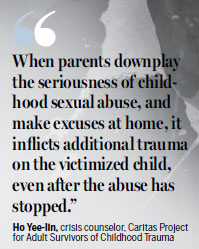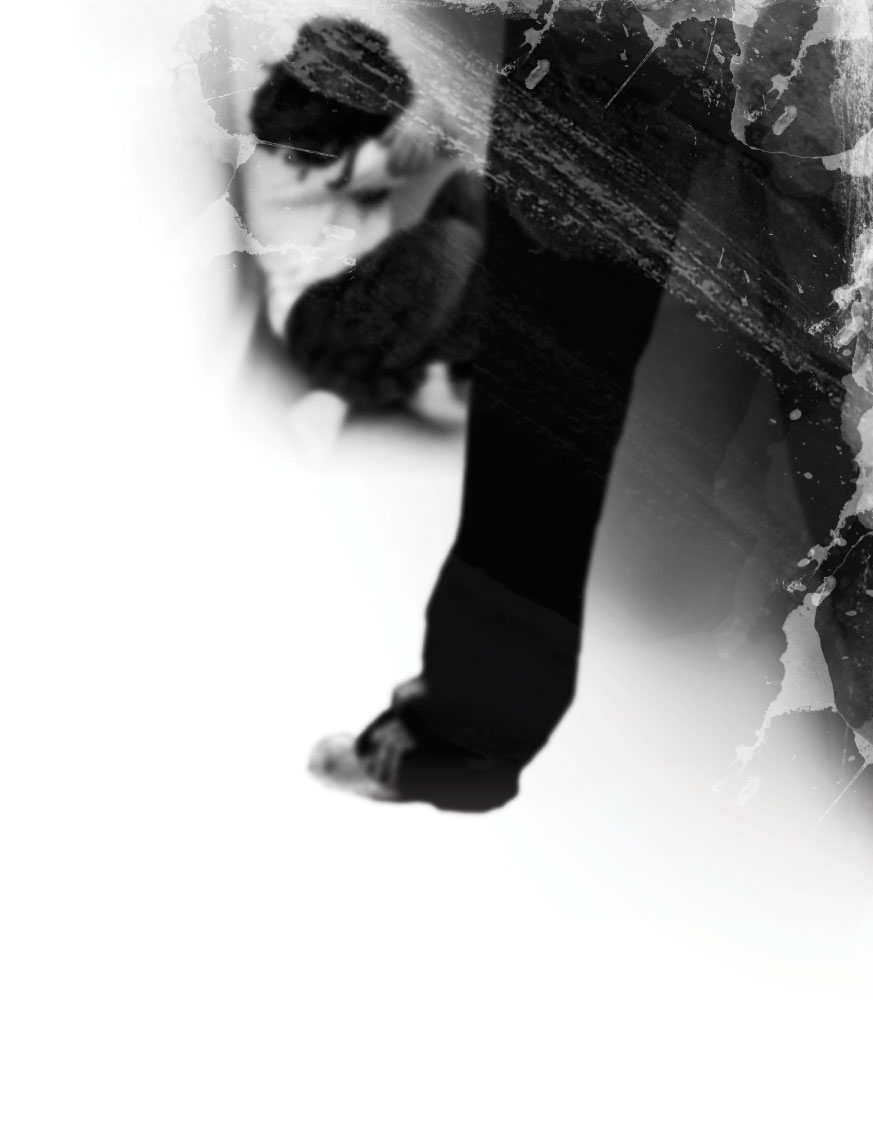It helps to talk
Updated: 2016-07-28 07:16
By Honey Tsang(HK Edition)
|
|||||||
Crisis intervention agencies in HK are encouraging and aiding victims and their families to report incidents of child sexual abuse at the earliest possible. Honey Tsang reports.
For all the effort to stamp out childhood sexual abuse there are victims nearly impossible to protect. It happens when families, though fully aware of the abuse, are too embarrassed to confront the problem at home.
Such is the sad story of Lily Wong (name changed), a childhood sexual abuse survivor. It had been a year since her abuser, a family member, crept in her room, slipped into the bed beside her and began fondling her. The 11-year-old thought she had seen the last of that man when he was caught in the act by another family member. But now the abuser was back. It was apparent that her family had condoned the abuse. Wong felt utterly helpless.
"I was terrified at the time, I didn't even dare open my eyes," Wong recalls. Even today she cannot bring herself to disclose her relationship with her tormentor.
The man began abusing Wong when she was 3, too young to understand what was happening to her. Some youngsters don't even know they're being exploited. They don't know what sexual exploitation is, said Tam Chi-yun, the executive director of the End Child Sexual Abuse Foundation (ECSAF).

Wong realized she was being abused and needed to protect herself only after reaching Primary Five and attending a sex education class.
"You shouldn't do this to me. This is not right," Wong told her abuser, finally mustering the courage to confront him. Her molester remained unfazed and the abuse continued. She was too afraid to say no.
"When parents downplay the seriousness of childhood sexual abuse, and make excuses at home, it inflicts additional trauma on the victimized child, even after the abuse has stopped," said Ho Yee-lin, Wong's crisis counselor at the Caritas Project for Adult Survivors of Childhood Trauma.
Ho maintained some families condone sexual abuse because confronting it would mean disrupting family harmony, especially if the abuser is one of the parents, especially if it's the breadwinner. Some are told not to talk about such incidents outside the family because they don't want a member of their family locked up in jail, Ho told China Daily.
Victims often don't say anything for years. It isn't uncommon for youngsters to keep quiet until they're adults. Some are embarrassed, some feel threatened by their abuser, and some fear the disclosure will provoke a negative reaction from their parents.
Wong too kept her secret bottled up for 17 years, even as she suffered internally. "I didn't like staying at home. I would be in tremendous panic," Wong told China Daily, adding: "It seemed I couldn't share this terrible struggle that left me feeling desolate with my family."
Data from the ECSAF shows that around 11 percent of victims of child sexual abuse reported in 2014 were abused by family members - grandparents, parents, siblings - people they knew and had trusted.
Wong is 28 now. She appears stricken as she speaks of the long ordeal that filled her with self-loathing and sense of feeling filthy. She tells her story hesitatingly and confesses she is afraid of men.
"I had no opposite-sex friends in secondary school," says Wong. "I couldn't help feeling distressed while I talked to the boys."
When a child is sexually exploited by his or her family member, it's always found the affected minor has a huge obstacle to trusting others, says Ho. The other common post-abuse impacts, which vary case by case, include becoming psychologically numb, and/or highly irritable and losing sense of self-worth.
From 2015 to 2016, the Social Welfare Department ran 145 training courses for 7,500 frontline professionals, including social workers, educators, healthcare personnel and police officers, aiming to facilitate early detection of suspected child abuse cases. Any service unit or individual could report a suspected case of child sexual assault, if they picked up on warning signals.
They have been running a family support program since 2005, to reach out to households where child abuse is suspected, through phone calls and home visits. Meanwhile, social workers will encourage families reluctant to address the problem at home to receive appropriate support services.
Sex education classes
Kindy Lam Yuk-ip, a clinical psychologist with the Social Welfare Department, completed a study in 2010, for which 147 sexually-abused Hong Kong adolescents were interviewed. Only 74 victims had reported the abuse to one or more confidants, amounting to a disclosure rate of 50 percent.
Ambrose Lo of the Department of Statistics and Actuarial Science at the University of Hong Kong suggests in a research paper that there is a pressing need to reform sex education in the city. Lo suggests sex education must be made obligatory in schools, with a "stipulated number of class periods and well-defined curriculum" for both junior and senior pupils.
ECSAF was founded in 1998, to address the needs of younger kids who weren't getting sex education in schools and therefore were most vulnerable. The foundation's mission is to try to protect children, with heavy emphasis on preventive education.
Its two mobile classrooms, for primary and secondary schools, travel around the city delivering the program. The organization hopes to expand its services to senior secondary students, adds Tam.
From January to March 2016, there were 71 cases reported to the Social Welfare Department, accounting for 38 percent, or the second-most serious, of abuses against children, including physical abuse, neglect, psychological abuse, and multiple abuse.
Lam told China Daily, dealing with suspected child sexual case is the sort of work that calls for a "multi-disciplinary collaboration". Teachers, social workers and psychologists related to each abused child are brought together within two weeks of receiving the report to decide the next course of action. The presence of different parties result in a robust synergy, and help map out the most effective initial welfare plans for a victimized child, Lam added.
"It's crucial for the professionals, who attend the case conference, to discuss how to assist the child victim in cultivating stable and healthy social relationships. This helps the kid feel safe and settled after the abuse," Lam continued.
At the next stage social workers become facilitators. To reduce the blows of repeatedly describing the incidents, social workers will make the assessment interviews on a suspected case to a minimum, said Lam.
Once the contours of buried domestic child sexual abuse are assessed, some organizations discern the need of an obligatory reporting system. In December last year the non-government child protection agency, Against Child Abuse, appealed to the government to introduce mandatory reporting of suspected cases of child abuse by professionals associated with the child in question. They are to report or refer such cases for following up by appropriate authorities.
Tam told China Daily at present it's not mandatory for arrested perpetrators of child sexual abuse to go through psychological counseling. She has urged the authorities to provide obligatory counseling service for wrongdoers. The government, however, is still to act on the suggestion, saying there isn't a consensus among the various parties involved yet.
Contact the writer at
honeytsang@chinadailyhk.com

(HK Edition 07/28/2016 page8)